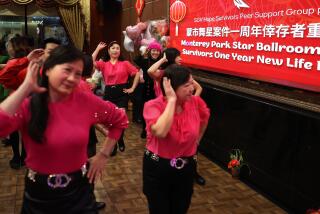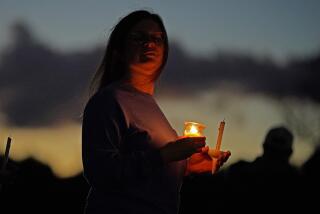‘Nobody kill anybody’: Exhausted by homicides, neighborhood leaders call for a murder-free weekend in Baltimore
A 44-year-old mother might seem an unusual visitor on the drug corners of Baltimore, but Erricka Bridgeford has shown up for weeks to make her pitch for peace.
Forget your grudges for one weekend, she urges the young men she finds. Help bring a 72-hour truce to a city besieged by gun violence.
“It’s a citywide call,” she tells them, “but I’m talking to you.”
Bridgeford and other neighborhood leaders are gathering support for a three-day cease-fire the first weekend of August to quell Baltimore’s violence. She admits that such peace is a tall order for a city that’s seen 189 killings this year.
Organizers aim to stop the shooting from Aug. 4 through 6, with a unified and blunt message: “Nobody kill anybody.”
Their message has been printed on T-shirts and fliers. They designed a website and held community meetings. More than 1,600 people visited their Facebook page. The grass-roots campaign has swelled since it began in May.
“I’ve seen the momentum build over the past several weeks,” said T.J. Smith, spokesman for Baltimore police. “We are all in this together, and we’re 1,000% supportive of the efforts.”
The campaign urges people to put aside their guns and join weekend events for healing, from a peace rally that Friday evening to a vigil Sunday where participants will read the names of every person killed in 2017.
“The Baltimore Ceasefire was not declared by any one organization,” organizers wrote on their website. “This ceasefire is the product of Baltimore residents not only being exhausted by homicides, but believing that Baltimore can have a murder-free weekend if everyone takes responsibility.”
More than 600 people have pledged to keep the peace, they wrote. Among them are some of the young men Bridgeford has met on the corners.
“You just talk to them like they’re your little brother,” she said.
A professional mediator, neighborhood volunteer and part-time Uber driver — “Everyone who gets in my car leaves with a flier and a speech” — Bridgeford says her younger brother was gunned down a decade ago in southwest Baltimore. His killer was never caught.
Next month’s cease-fire would prove successful if it deters a single shooting, she said. And she figures the movement has already saved a life somewhere.
“Somebody was plotting on this weekend,” she said. “Now they’re not going to do it because of a rumbling in their soul.”
The organizers are raising money through their website for more fliers. Some of the money will be donated to the families of anyone killed over the cease-fire weekend. Bridgeford is urging everyone she meets to echo the call for peace.
“Jumping out in open-air drug markets might not be for everyone,” she said. “But we’re asking everyone to do their part.”
Community cease-fires, however, have failed to stem the violence in the past. The group Mothers of Murdered Sons called for a cease-fire over Mother’s Day weekend, but at least four people were shot, including a 59-year-old man and 17-year-old woman. Both were killed.
Other communities have called for cease-fires after spates of violence in Birmingham, Ala., and Berkeley, Calif. Such efforts are as much about empowering residents as reducing homicide statistics, said Cassandra Crifasi, deputy director of the Johns Hopkins-Baltimore Collaborative for Violence Reduction.
Persistent violence often leaves neighbors feeling powerless, she said.
“Communities feel like they can’t do things for themselves. They don’t have a voice. They don’t feel heard,” Crifasi said. “This effort seems to me like the people most affected by violence are standing up and saying, ‘We’re not going to take this anymore.’”
A similar awareness campaign that began in Chicago in 2013 has spread across the country, with people wearing orange in June to draw attention to the scourge of gun violence. Across the country, more than 90 people are shot and killed every day, according to the Wear Orange campaign.
Baltimore, meanwhile, remains gripped by its own violent surge, with 2017 on pace to be the city’s deadliest year ever. The number of homicides shot up to 344 in 2015; 318 people were killed last year. Baltimore had not exceeded 300 annual homicides for decades before 2015.
“I’m cautiously optimistic,” Crifasi said of the cease-fire. “It indicates to me there are lots of people in Baltimore still invested in the safety and security of their communities.”
People like Bridgeford, who has carried the message to Baltimore’s drug corners. She found an unexpected audience, even encouragement in the streets.
“I’ve absolutely heard skepticism,” she said. “But even the skeptics are like, ‘Stay out here.’”
Prudente writes for the Baltimore Sun.
More to Read
Start your day right
Sign up for Essential California for news, features and recommendations from the L.A. Times and beyond in your inbox six days a week.
You may occasionally receive promotional content from the Los Angeles Times.






